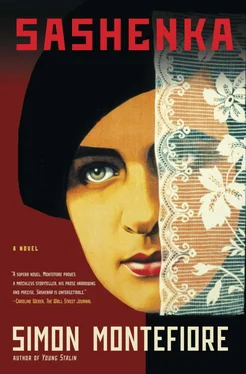“Oh my heart!” he bellowed, regardless of the gendarmes. “There she is! Come on! Everyone’s waiting!” At that moment, she loved his cognac-and-cigars scent and inhaled it hungrily.
And then she was outside in the freezing light of northern winter. Her father’s Russo-Balt landaulet, with chains on its wheels against the ice, lurched forward. Pantameilion, a flash of scarlet and gold braid, ran round to open the door and Sashenka almost collapsed into that leather-lined, sweet-smelling compartment with its fresh carnations in the silver vase. Lala’s arms enveloped her and Uncle Gideon climbed into the front seat, swigged some brandy from his flask and took up the speaking tube.
“Home, Pantameilion, you young ladykiller! Fuck Mendel! Fuck the Revolution and all the ideeeots!” Lala rolled her eyes and the two women laughed.
As they crossed the bridge, Lala handed Sashenka the tin of Huntley & Palmers and her babushka Miriam’s Yiddish honeycakes. She ate every delicacy, thinking that she had never so loved the spire of the Admiralty, the rococo glory of the Winter Palace—and the golden dome of St. Isaac’s. She was going home. She was free!
Uncle Gideon threw open the door at Greater Maritime Street as Sashenka, running up the steps, rushed past Leonid, the old butler who, with tears in his eyes, bowed low from the waist like a village muzhik before his young mistress. Gideon tossed his shaggy furs at the butler, who almost crumpled under the weight, and demanded one of the footmen help him pull off his boots.
Sashenka, feeling like the little girl who was occasionally presented to her busy father, ran to his study. The door was open. She prayed he was there. She did not know what she would do if he wasn’t. But he was. Zeitlin, in winged collar and spats, was listening to Flek.
“Well, Samuil, the prison governor demanded four hundred,” said the toad-like family lawyer.
“Small change compared with Andronnikov…” But then Zeitlin saw her. “Thank God, you’re here, my darling Lisichka-sestrichka—Little Fox Sister!” he said, reverting to one of her childhood nicknames. He opened his arms and she leaned into him, feeling his tidy mustache on her cheek, bathing in his familiar cologne, pressing her lips against his slightly rough skin. “Let’s get your coat off before we talk,” he said, releasing himself from her arms and leading her into the hall. Leonid, following dutifully in her wake, removed her coat, stole and shawl, and then she noticed her father was looking her up and down distastefully, his nostrils twitching. Sashenka had quite forgotten that she was still wearing her soiled Smolny pinafore. Suddenly she could smell the filth of prison that clung about her.
“Oh Sashenka, is that blood?” her father exclaimed.
“Oh dearest, we must get you bathed and changed,” cried Lala in her high breathy voice. “Luda, draw a bath at once.”
“Sashenka,” murmured Zeitlin. “Thank God we got you out.”
She yearned to wash yet she stood still, reveling in the shock of her father and the servants. “Yes!” she proclaimed, her voice breaking. “I’ve been to prison, I’ve seen the tombs that are the Tsar’s jails. I’m no longer the Smolny girl you thought I was!”
In the silence that followed, Lala took Sashenka’s hands and led her upstairs to the third floor, which was their own country. Up here, every worn piece of carpet, every crack on the landing walls, the damp stain on the pink wallpaper of her bedroom with its playful pictures of ponies and rabbits, the yellowed enamel of the basin in her English washstand, reminded Sashenka of her childhood with Lala, who had decorated her room to create a loving sanctuary for an only child.
The landing was familiar—a mist of Pears pine bath essence and Epsom salts. Lala brought her straight into the bathroom, which was lined with the most indulgent British toiletry products, beautiful blue and amber and green bottles of lotions and oils and essences. The chunky bar of Pears soap, black, cracked, beloved, waited on the wooden bath rack.
“What are we having today?” asked Sashenka.
“Same as always,” replied Lala. Sashenka, even though she now regarded herself as an adult, did not resist as Lala undressed her and handed her stinking clothes to Luda.
“Burn them, will you, girl,” Lala said.
Sashenka loved the feel of the soft carpet under her feet and the misty essences curling around her. She glanced at her nakedness in the foggy mirror and winced at a body she preferred not to see as Lala helped her into the bath. The water was so hot, the bath (English again, imported from Bond Street) so deep that immediately she closed her eyes and lay back.
“Darling Sashenka, I know you’re tired,” said Lala, “but just tell me, what happened? Are you all right? I was so worried…” And she burst into tears, large teardrops trickling down her wide cheeks.
Sashenka sat up and kissed the tears away. “Don’t worry, Lala. I was fine…” But as she settled into her bath, her mind traveled back to her final conversation with Mendel last summer holidays…
It had been soomerki , that beautiful word for summer dusk. The oriole sang in the pine forest. Otherwise, it was quiet in the lilac light.
Sashenka had been lying in the hammock behind their house at Zemblishino, rocking gently and reading Mayakovsky’s poetry to herself, when the sleepy swinging stopped. Mendel had his hand on the hammock.
“You’re ready,” he said, sucking on a cigarette. “When we get back to the city, you’ll take on some workers’ circles so you can teach them what you know. Then you’ll join the Party.”
“Not just because I’m your niece?”
“Family and sentiment mean nothing to me,” he replied. “What are such things compared to the course of history itself?”
“But what about Mama and Papa?”
“What about them? Your father is the arch exploiter and bloodsucker of the working class and your mother—yes, my own sister—is a degenerate haute bourgeoise. They’re enemies of the science of history. They’re irrelevant. Understand that and you’re free of them forever.”
He handed her a pamphlet with the same title as the first book he had given her weeks earlier: “What Is to Be Done? Burning Questions of Our Party” by Lenin. “Read it. You’ll see that to be a Bolshevik is like being a knight in a secret military-religious order, a knight of the grail.”
And sure enough, in the weeks that followed, she had felt the joy of being an austere and merciless professional in Lenin’s secret vanguard.
When she returned to the city, she began to lecture the workers’ groups. She met ordinary workers, proletarians in the colossal Petrograd arms factories, men, women, even children who possessed a gritty decency she had never encountered before. They slaved in dangerous factories and existed in airless grimy dormitories without bedding or baths or lavatories, without light or air, living like rats in a subterranean hell. And she met the workers who manufactured the rifles and howitzers that had made her own father a rich man. Daily, she worked with the most fiery and dedicated Party members who risked their lives for the Revolution. The clandestine world of committees, codes, conspiracy and comrades intoxicated her—and how could it not? It was the drama of history!
When she should have been at dance lessons or visiting Countess Loris’s house to play with her friend Fanny, she started to act as Mendel’s courier, carrying first leaflets and spare parts for printing presses but then “apples” (grenades), “noodles” (ammunition), and “bulldogs” (pistols). While Fanny Loris and her schoolfriends composed scented letters in curling, girlish handwriting to young lieutenants in the Guards, Sashenka’s billets-doux were notes with coded orders from “Comrade Furnace,” one of Mendel’s code names; and her polkas were rides on public streetcars or her father’s sleigh bearing secret cargoes in her lingerie or her fur-collared sluba cape.
Читать дальше












